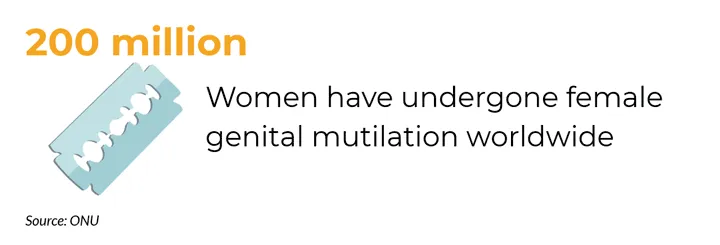International day of Zero Tolerance for Female Genital Mutilation
4 minuteRead

Female genital mutilation (FGM) refers to all procedures that involve altering or injuring the female genitalia for non-medical reasons and is widely condemned around the world as a violation of girls' and women's human rights, health, and integrity.
According to data from the World Health Organization (WHO) and UNICEF, more than 200 million women and girls have been subjected to FGM in 30 countries across Africa, the Middle East, and Asia. Every year, 3 million girls are at risk of FGM, an ancient practice that the United Nations (UN) regards as a violation of human rights.
The International Day of Zero Tolerance for Female Genital Mutilation is observed on February 6th, and it is a priority in the Sustainable Development Goals (SDG) to put an end to this practice by 2030, the year agreed to, among other things, to end gender inequality.

Source: https://www.dianova.org/
FGM has been on the social-political agenda of several international organisations seeking a total ban for several decades. To that end, the measures have urged the revision of legal frameworks as well as increased public scrutiny of the brutal tradition, which can result in death as well as crippling physical and psychological consequences for the girls who survive.
This work has had some success, but there is still much more to be done. Girls aged 15 to 19 in Kenya and Tanzania are three times less likely to be subjected to genital mutilation than their mothers were at the same age. The government of Liberia has agreed to a one-year ban on this practice. Religious leaders in Sudan have declared that FGM is not directly related to the Islamic faith, and an increasing number of men from countries where it is practised are opposed to it.
The COVID-19 pandemic has negatively and disproportionately affected girls and women in 2020, resulting in a shadow pandemic that has disrupted SDG target 5.3 on the abolition of all harmful practices, including female genital mutilation. According to UNFPA, an additional 2 million girls are expected to be at risk of female genital mutilation by 2030. In response to this disruption, the United Nations has been adapting interventions that ensure the inclusion of female genital mutilation in humanitarian and post-crisis response through its UNFPA-UNICEF joint programme.
Violence against women
The total or partial removal of the visible tip of the clitoris and the labia minora, as well as their narrowing (infibulation), renders sexual pleasure impossible and causes serious haemorrhages, genital tissue injury, fevers, urinary problems, infections such as tetanus, cysts, and complications in childbirth, among other health issues. Women may experience psychological issues in the long run (depression, anxiety, low self-esteem, post-traumatic stress disorder).
According to Amnesty International, the physical and psychological consequences of female genital mutilation have turned it into a form of violence and torture against women and children, as well as a violation of human rights and gender equality. As a result, governments must continue to take action on the issue, with a genuine commitment to dialogue and action.

Source: https://www.dianova.org/
To promote the abolition of female genital mutilation, coordinated and systematic efforts are required, with a focus on human rights, gender equality, sexual education, and attention to the needs of women and girls who suffer as a result of its consequences.
Society must be made aware of the cruel reality that millions of girls around the world face every year, as well as the fact that it is practised not only in Africa, but also in the Middle East and Asia, as well as among immigrants in Spain, the United States, Canada, and Colombia's Emberá-Cham indigenous community. Despite the fact that the latter has already pledged to end FGM once and for all in their community.
No Time for Global Inaction: Unite, Fund, and Act to End Female Genital Mutilation
The United Nations General Assembly declared February 6th as the International Day of Zero Tolerance for Female Genital Mutilation in 2012, with the goal of amplifying and directing efforts toward the abolition of this practice.
This year the UNFPA-UNICEF Joint Programme on the Elimination of Female Genital Mutilation and the Inter-African Committee on Traditional Practices (IAC) jointly launch the 2021 theme: "No Time for Global Inaction, Unite, Fund, and Act to End Female Genital Mutilation." Many countries are experiencing a “crisis within a crisis” due to the pandemic including an increase in female genital mutilation. That is why the United Nations call on the global community to reimagine a world that enables girls and women to have voice, choice, and control over their own lives.
UN Action

Source: https://www.un.org/
Although the practice has been around for more than a thousand years, there are reasons to think that female genital mutilation could end in a single generation. That is why the United Nations strives for its full eradication by 2030, following the spirit of Sustainable Development Goal 5.
Since 2008, UNFPA, jointly with UNICEF, leads the largest global programme to accelerate the elimination of female genital mutilation.
The Joint Programme currently focuses on 17 countries in Africa and the Middle East and also supports regional and global initiatives.
This collaboration has seen significant accomplishments over the years. For example, more than 2.8 million people signed public declarations calling for the abolition of FGM, and the number of communities establishing surveillance structures to track girls more than doubled, protecting 213,774 girls from the practice.
Write, Record and Answer! Consume Unlimited Content! All you need to do is sign in and its absolutely free!
Continue with one click!!By signing up, you agree to our Terms and Conditions and Privacy Policy.










